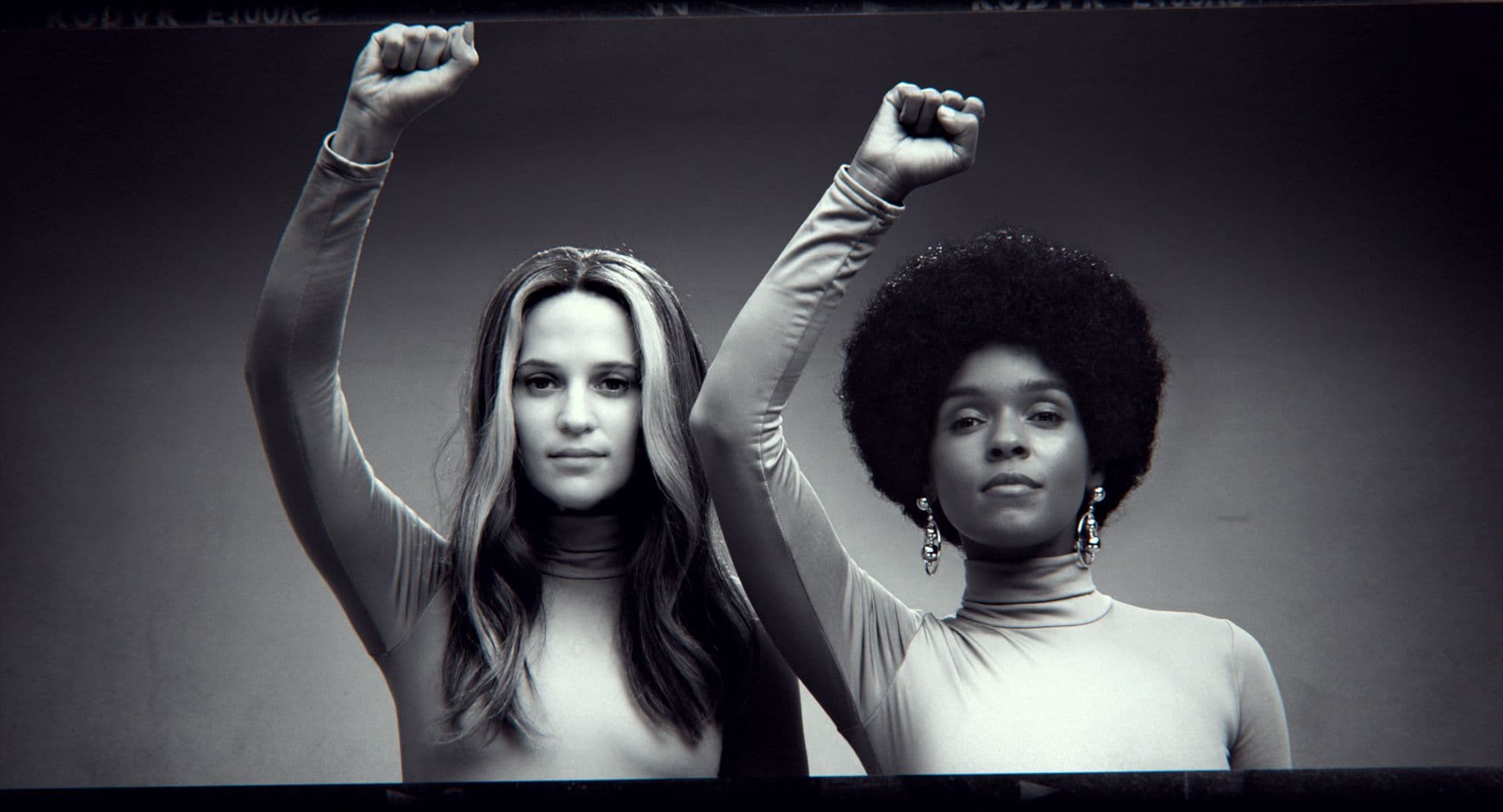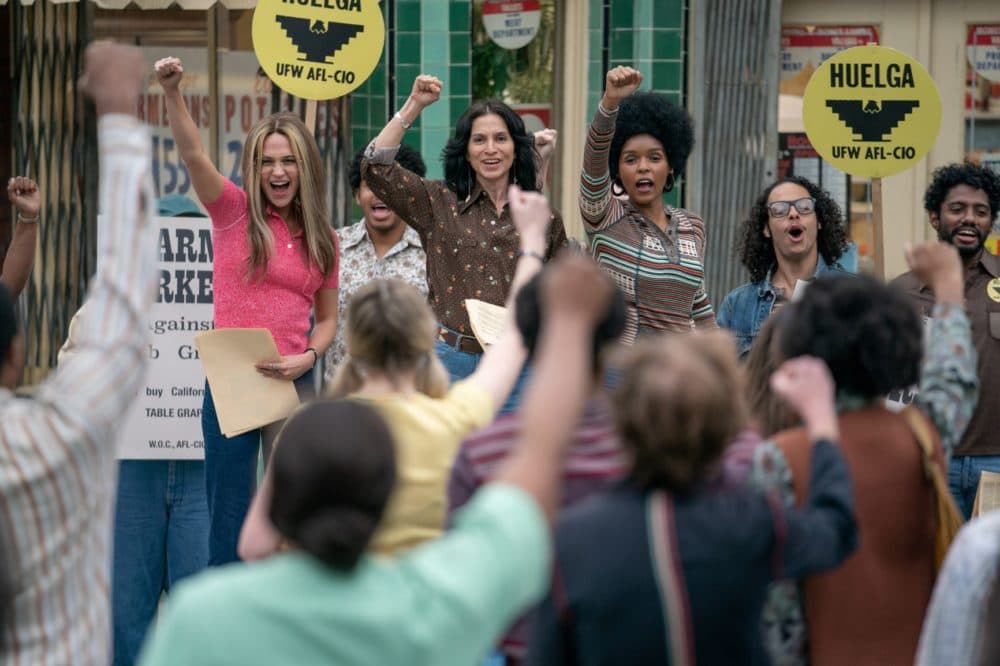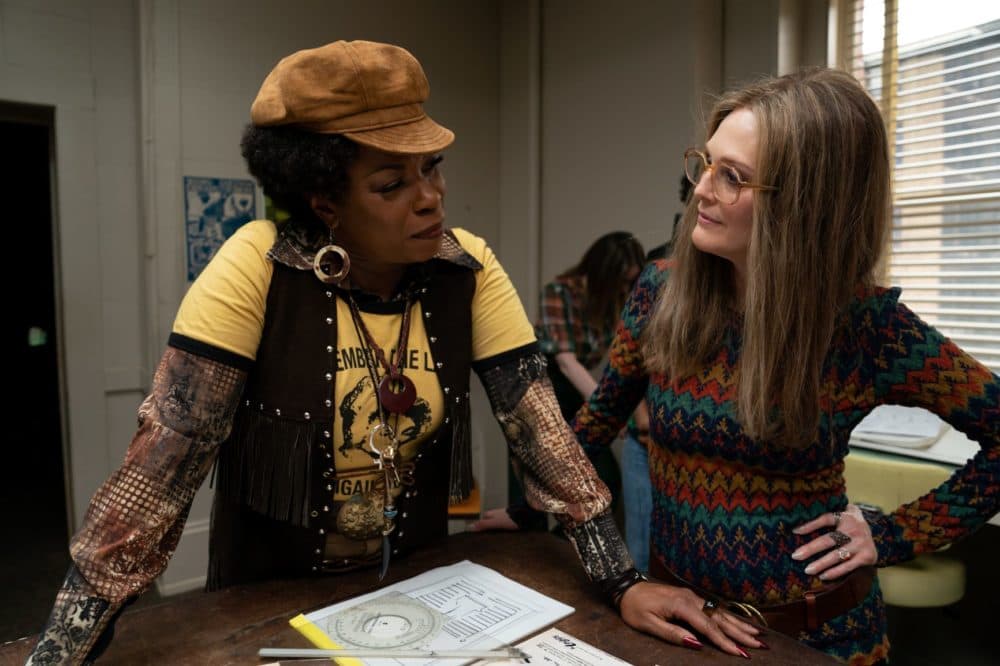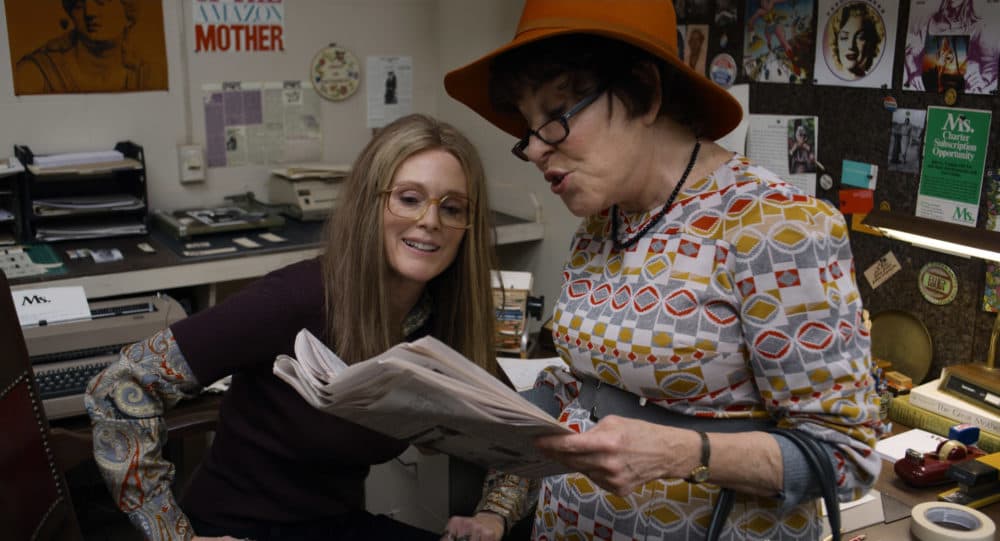Advertisement
Review
Ambitious Biopic 'The Glorias' Examines The Life And Influences Of A Feminist Icon

While often considered the sole symbol of American second-wave feminism, Gloria Steinem has made it her life’s mission to oppose hierarchical systems. After all, the same top-down thinking that perpetuates sexism, racism and classism also loves icons. Those working in opposition to hierarchies during the 1970s and since, including Steinem herself, saw the simplistic reduction of describing her as the “face of feminism” as disingenuous.
Over the last few decades, achievements by women of color and women and girls from outside of the United States have gained belated notoriety. But part of Steinem’s story will always be about what it meant to be cast in a role that wasn’t quite right.
The time has come to reckon once more with Steinem as a leader and representative of the evolving feminist movement. Indeed, both have been fictionalized this year: onstage in “Gloria: A Life,” in the Hulu TV series “Mrs. America,” and now in the epic ride of a movie “The Glorias,” where Steinem and her selves at different ages crisscross the United States by bus. (The stage and movie versions also include archival footage.)

This is a lot of Gloria — and yet altogether not enough — for someone like me, who came of age in the 1990s, that unfortunate stretch when you were better off calling yourself ‘bitch’ with a laugh than ‘feminist’ in earnest. (These kinds of associations linger; as late as 2017 I marveled that a non-niche outlet like WBUR would use the word feminist positively in a headline.) As a result, a willingness to pay any attention to American feminist history and its leaders is both thrilling and off-putting.
For that reason, all three Gloria-related stories make worthwhile contributions to a larger dialogue made more urgent by the current political climate. Foremost, all three include key but less heralded change-makers like Dorothy Pitman Hughes, Shirley Chisholm, Florynce Kennedy and Bella Abzug. With a nod to consciousness-raising groups, the play features a second act that invites audience sharing. While the Phyllis Schlafly frame unnecessarily compromises its feminist storyline, the series’ ensemble approach delves into leaders one episode at a time, rightfully giving Chisholm her own. Uzo Aduba won an Emmy for her outstanding portrayal of the first Black woman (and first woman) who sought nomination for the U.S. presidency. The film’s structure of multiple Glorias comes closest to capturing Steinem’s inclusive, collective and forgiving spirit.
Director and co-writer Julie Taymor’s “The Glorias” is an ambitious, rousing and rewarding two-plus-hour ramble through Steinem’s life and influences. Apropos to Steinem’s belief in reciprocity, the influences encompass those on Steinem, focusing especially on her parents Leo and Ruth (endearingly played by Timothy Hutton and Enid Graham), as well as the impact she had on American culture at large. “The Glorias” caps off a welcome year of Steinem-ism, what her father might call “Steinem-ite,” but it should not be the last word.
Based on Steinem’s 2015 memoir “My Life on the Road,” the film lingers over her formative years as the child of an upbeat huckster father and a mother incapacitated by depression. The movie’s initial period-era Hollywood gleam, including a wildly entertaining barbershop tap scene, could confuse a viewer into thinking they’re opening a box of Forrest Gump’s chocolates, not a story about a nascent “radical” activist. Consider it the innocent set up for later scenes, like when child Gloria asks an insulting talk show host, “What’s a sex object?”

Except for a few summers at her father’s optimistically-named Ocean Beach Pier on a lake in southern Michigan, child Gloria moves around so much she can’t attend school. Adolescent Gloria settles in Toledo with her mother, who requires more care than her daughter. As this chronologically unfolds, glimpses of future Glorias come in the form of the smart and curious young traveler to India played by Alicia Vikander and the familiar adult activist played with earned wisdom by Julianne Moore.
It takes time to get to what some will think of as the good stuff, like Steinem’s undercover stint as a Playboy Bunny, something Taymor insisted on despite Steinem’s stance that it has haunted her ever since. Soon after, she and others dream up Ms. Magazine in her living room. This compulsory scene feels nowhere near as natural as every exchange with Lorraine Toussaint as firebrand Flo Kennedy. Her delivery of one-liners (“We got to stop sucking and begin to bite”) earns laughs and, mark my words, future awards. Bette Midler gets in her jabs as Abzug; these women know how to laugh.
From her time in India to her long friendship with Cherokee Nation chief Wilma Mankiller (Kimberly Guerrero), “The Glorias” makes clear that other women guide and inspire Steinem as much as she does them. Ms. co-founder Pitman Hughes (Janelle Monáe) helps Steinem overcome her terror of public speaking. When a Harvard Law School faculty member insults Steinem during an address, Kennedy’s voice assures, “Just pause and say, ‘I didn’t pay him to say that.’”

Incidences like what happened at Harvard come off as nervy in the book and play even more viscerally in the film. Taymor wants to underscore the cavalier nonchalance of Steinem’s and other women’s harassers. The film recreates sexually aggressive exchanges with multiple white male bosses and co-workers and integrates likewise harrowing archival footage. Talk show host David Susskind declares on behalf of all men, “You feel like kissing her or hitting her, I can’t decide which.”
Because of this, “The Glorias” may resonate the most with the Gen Xers, sandwiched between women who lived through the second wave (and thus witnessed it the first time) and the millennials more certain about gender fluidity and women’s and LGBTQ+ rights. For them “The Glorias” may ring a little old fashioned, like nostalgia for their grandmothers instead of for them. That would be too bad. It’s no secret that those advocating for women’s rights have had to span many generations, encompassing so much and so little cultural change that age alone can feel like a dividing line.
At one point in the film, Steinem says, “I refuse to add fuel to the idea that women can’t get along.” Just as Steinem’s image has erroneously stood in for many women, so too has the idea that feminism divides more than it unites. One of the film’s greatest pleasures is watching one era’s Gloria reassure another era’s Gloria with the squeeze the hand. Or when the older leans on the younger’s shoulder. Steinem has modeled so many forms of grace over her 86 years, not least of which is how to age.
Not all of us fancy ourselves a Gloria. But this film comes down hard on one thing: there’s room for everyone on her bus. She’s left the door open.
“The Glorias” is available on digital and streaming exclusively on Amazon Prime Video starting Sept. 30.
